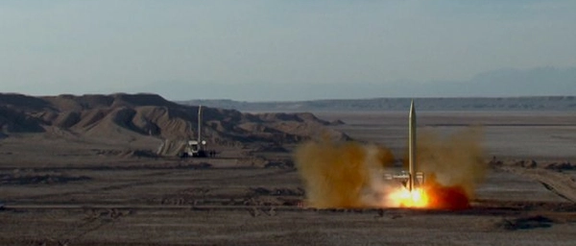Following repeated threats from Iranian officials to avenge the assassination of Hamas leader Ismail Haniyeh in Tehran, the Islamic Republic is apparently holding a series of military exercises amid fears of a full-blown war with Israel.
Morad Babakhani, the political deputy governor of Qasr-e Shirin in Kermanshah province confirmed that the Islamic Revolutionary Guard Corps (IRGC) has been conducting military drills from August 9 to 13.
Babakhani sought to reassure local residents by linking the sound of explosions to the exercises, claiming there was "no reason for concern." However, the reassurances do little to mask the broader implications of the IRGC's maneuvers.
Preparing for war or training Russian personnel?
A new NOTAM issued on Saturday warned pilots to avoid flying over an area near Iran's Nojeh air base in Hamadan due to scheduled gunfire from August 11 to 14. It is not yet clear if the NOTAM (Notice to Airmen) issued for Hamadan air base is connected to the Sunday wargames, but the warning might suggest a scenario that is not much relevant to the ongoing Iran-Israel tension, but to the ongoing conflict in Europe.
Reuters reported on Friday that dozens of Russian personnel are being trained in Iran to use the Fat’h-360 close-range ballistic missile system.
In 2016, Iran granted Russia permission to conduct air operations in Syria from the same airbase in Hamadan, and it seems a likely scenario that the Russian personnel are using the Nojeh airbase again, this time for training purposes.
In the ongoing Iran-Israel conflict, Russia has tried to remain neutral and publicly called for restraint from both sides. However, according to a report by The New York Times on Monday, Iranian officials claim Russia has begun delivering advanced air defense and radar equipment to Iran following Tehran's request for these arms, increasing Tehran's preparedness for a possible war with Israel.
A dangerous game: Tehran’s aggressive posturing
Iran and the Palestinian Islamist group Hamas have accused Israel of killing Haniyeh on July 31. While Israel has neither confirmed nor denied responsibility for the killing, the incident has heightened fears that the ongoing war between Israel and Hamas in the Gaza Strip could escalate into a broader conflict across the Middle East.
The IRGC's military exercises come at a particularly precarious time. According to an exclusive report by Iran International, President Masoud Pezeshkian has recently met with Supreme Leader Ali Khamenei to plead with him to avoid direct military action against Israel. Pezeshkian reportedly warned Khamenei that any such move could provoke Israeli retaliation, targeting Iran’s critical infrastructure and energy resources.
The potential consequences are dire: a full-blown conflict that could cripple Iran's already struggling economy and possibly lead to the clerical rulers’ collapse. Yet, despite the warnings and the calls for restraint, the Islamic Republic appears intent on escalating the situation. It has threatened to launch direct missile strikes on Israel in response to Haniyeh's assassination, a move that would almost certainly trigger a response from Tel Aviv.
Global pressure and diplomatic efforts
In recent days, international diplomatic efforts have intensified to dissuade Tehran from following through on its threats. The Guardian reported on Thursday that the Islamic Republic might be reconsidering the scale and nature of its retaliatory attack against Israel, largely due to significant diplomatic pressure aimed at preventing civilian casualties.
However, the lack of explicit support from Islamic countries for Tehran's military response does not seem to have deterred Iran. Reports from The Telegraph indicate that while the IRGC is pushing for a missile strike on Tel Aviv, Pezeshkian has suggested targeting Israeli-affiliated sites in Azerbaijan or Iraqi Kurdistan as an alternative, with prior notification to those countries.
Simultaneously, Politico reported that the Biden administration has been working through diplomatic channels to persuade Tehran to reconsider its plans for a military attack on Israel. US officials have warned Iran that a large-scale assault would only escalate tensions and increase the likelihood of a direct confrontation between the two nations.
The reality of escalation
Despite the diplomatic efforts, the situation on the ground suggests that Tehran is preparing for another serious escalation. On the evening of April 13, the Islamic Republic launched an unprecedented attack on Israel, using over 300 cruise and ballistic missiles and drones. This marked the first direct assault by Iran on Israeli soil, signaling a shift from the years-long shadow war between the two countries to open confrontation.
Israel’s response was swift and decisive. On the morning of April 19, Israeli forces targeted a military base in Isfahan, underlining their readiness to retaliate against Iranian aggression.







